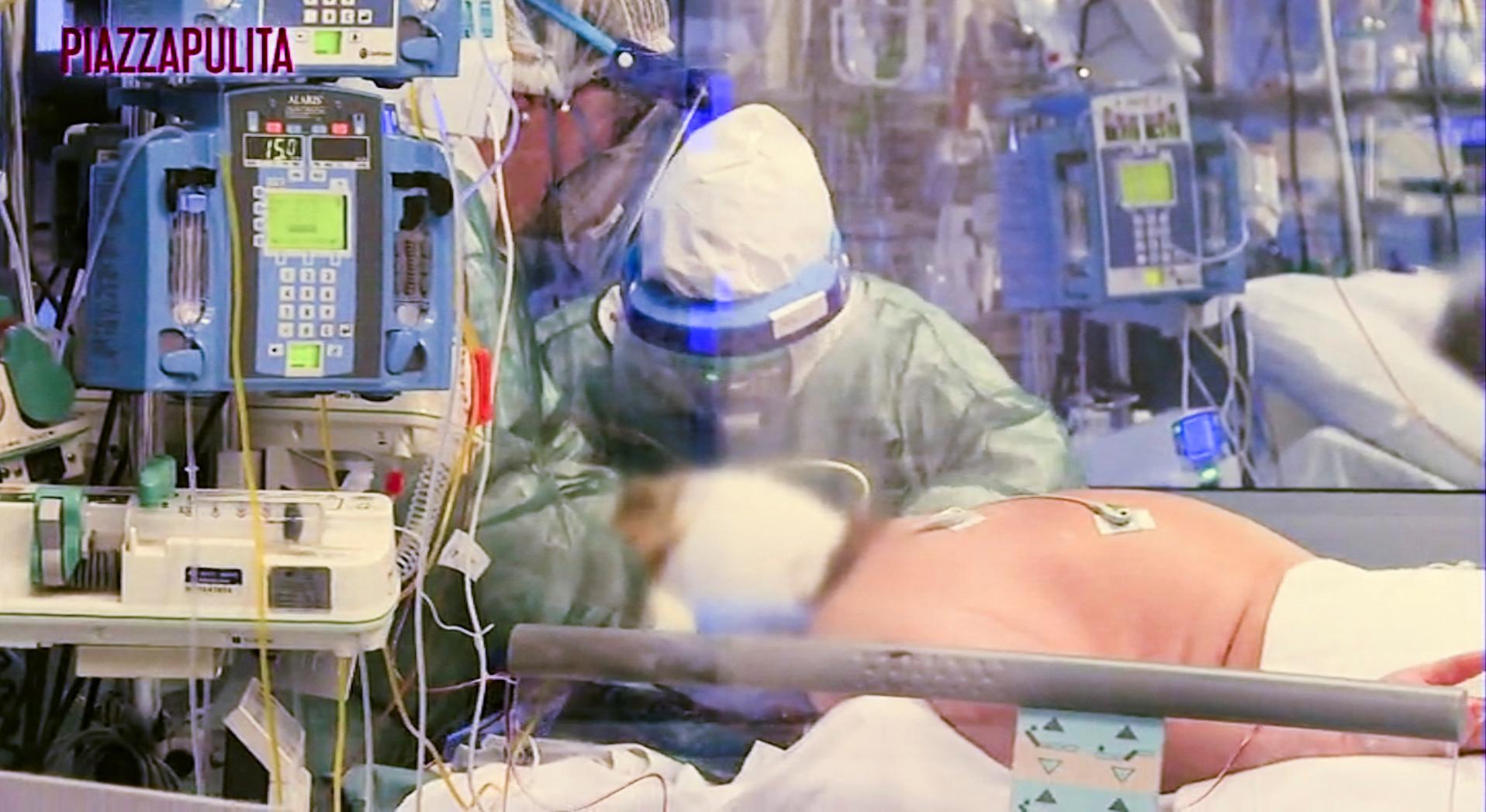Medical staff in protective suits treat coronavirus patients in an intensive care unit at the Cremona hospital in northern Italy, in this still image taken from a video, March 5, 2020.
Shops and restaurants closed, hundreds of flights were canceled, and streets emptied across Italy Tuesday, the first day of an unprecedented nationwide lockdown imposed to slow Europe’s worst outbreak of coronavirus.
Just hours after the dramatic new restrictions came into force, health authorities announced the death toll had jumped by 168 to 631, the largest rise in absolute numbers since the contagion came to light on Feb. 21.
Related: Streets deserted as Italy imposes unprecedented coronavirus lockdown
The government has told all Italians to stay at home and avoid non-essential travel until April 3, radically widening steps already taken in much of the wealthy north, which is the epicenter of the spreading contagion.
Italy’s Lombardy region in the north of the country, where Stefano Magnone works as a surgeon at the Papa Giovanni 23rd hospital, has been the hardest hit.
“We are treating around 300 patients. We are the main hospital in the province, which is now the province that sees the biggest number of patients,” Magnone told The World. “We are abandoning other kinds of activities just to deal with these patients because there are so many that all the doctors that usually do other things — like surgeons, like neurologists, like dermatologists — were training to have care of these patients. The infectious disease people … are not enough.”
Related: Travel restrictions could slow coronavirus spread, but they are ‘not enough alone’
Magnone spoke with The World’s Marco Werman about the impact the virus is having in Italy.
Marco Werman: Well, we now know that people, when they experience these symptoms, they’re not supposed to go to the emergency room. They’re supposed to stay at home and self-quarantine for two weeks. But are you seeing patients anyway, still coming to the hospital with symptoms? And how do you manage that? You keep them from entering the ER?
Stefano Magnone: Absolutely. All the patients that are breathing normally are advised to stay at home and have a chat and by phone with the doctor or with the hospital. Only people that have breathing problems will be brought to the hospital. And they had to face a long queue to gain a bed. Because in 24 hours in Lombardy, we had 600 admission for coronavirus.
Ventilators are a key thing for patients who end up with pneumonia. Do you have enough ventilators?
Yeah, we are running out of them. So the government set out money to buy new ventilators. So this is the first problem. The second problem will be the shortage of doctors and nurses as well. So we have to recruit doctors, and we are changing our law because we had laws that are not coping with the emergency we are living now. We had this problem even before the crisis.
Related: Coronavirus shock and oil price fall pummel world stocks
Dr. Magnone, you’re a surgeon. You also want to help, but I gather you’re at home because you had symptoms of the coronavirus. What were your symptoms, and do you still have them?
Yeah, I’m recovering because I had very mild symptoms for two-three days last week. So I’m waiting for the swab. If this swab would be negative, I will be back soon at work.
Related: Italy’s kids celebrate school closures over COVID-19, but families worry about costs
So you’ve been tested. How easy is it to be tested in northern Italy right now?
We are testing only symptomatic patients that were in direct contact with coronavirus-positive patients. So we are not testing other people.
When will you be able to go back to work? When do you get your test results back?
This evening or tomorrow morning. So on Thursday, I will be back on work if the tests will be negative
Related: Travel bans are not the best way to contain coronavirus, expert says
In a Facebook post by a doctor — Daniele Macchini who works at the Humanitas Gavazzeni hospital in Bergamo — he talks about how the coronavirus has totally overwhelmed his hospital and the staff there. How are you feeling about jumping into this situation, assuming you come out with a negative?
Well, I read that post. The hospital is a few kilometers from us. It’s the same situation we are living. So the most important thing that governments and people can do to stop the spread of this crisis is to stay at home because we have to stop people meet[ing] each other. We have to gain a completely social isolation because this is the only way to stop the outbreak of the virus.
Related: Is South Korea’s approach to containing coronavirus a model for the rest of the world?
I assume that you as a doctor, you’d share the same advice with Americans who might kind of look at that with some disbelief.
I’m not sure some of you have realized what can happen even to you. So I suggest to pay much attention to that because this virus is traveling everywhere. So we are facing something that no one could imagine. So it’s very concerning because we are not seeing until now any decrease in the steep curve of new cases. So I’m very concerned.
This interview has been edited and condensed for clarity. Reuters contributed to this report.
Our coverage reaches millions each week, but only a small fraction of listeners contribute to sustain our program. We still need 224 more people to donate $100 or $10/monthly to unlock our $67,000 match. Will you help us get there today?
